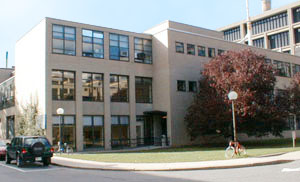Welcome

There are more than one billion automobiles in the world and counting. In a world constrained by climate change and greenhouse gases, the Sloan Automotive Lab is working to radically improve the energy consumption and environmental impact of transportation systems.
The mission of the Sloan Automotive Laboratory is to contribute to future developments in automotive technology through fundamental and applied research on propulsion technology and fuels.
We invite you to explore our current research and available positions.
What We Do
The goals of the Laboratory are to provide the fundamental knowledge base for automotive engineering and to educate students to become technological leaders in the automotive industry.These goals are achieved through extensive research activities in the areas of internal combustion engines and fuels, fundamental fluid/thermal/combustion studies, and assessment of advanced propulsion and vehicle technologies, and especially their energy consumption and environmental impacts.
The research activities are sponsored by the automotive and petroleum industries, by the government, and by private foundations. Examples of engine research themes include improving the performance and emissions of spark-ignited and compression-ignited or diesel engines, understanding fuel-air mixture preparation processes, and engine lubrication studies to reduce friction, wear, and oil consumption.
Fundamental research interests in combustion include autoignition, hydrocarbon oxidation chemistry, turbulent and laminar flame structure and flame propagation. A major assessment of future automotive technologies (more efficient engines and transmissions, hybrids, turbochargers) and their fuel requirements is underway, focusing on greenhouse gas emissions reduction.
The laboratory has ten test cells equipped with modern facilities for combustion, engine performance, and emissions research, and is equipped with the appropriate instrumentation, diagnostics, and computer systems. Five faculty and research staff members are involved in the Laboratory's programs, with about twenty graduate students and several undergraduates. Visit this page for more information about applying to MIT and working in the Sloan Automotive Laboratory.
Research Impact
Research at the Sloan Automotive Laboratory has a direct effect on the environmental impact of automobile fleets, government policy and advancing the state of the art in vehicle technology. We have a number of broad research focuses:
- engine efficiency improvements to increase power and/or performance,
- improve alternative fuel operation,
- advance the fundamental understanding of engine, technology and transportation policy processes,
- vehicle life-cycle CO2 emissions reductions.
Careers & Alumni
Sloan Auto Lab alumni are found far and wide in many industries. Apart from the automotive industry and its suppliers, Sloan Auto Lab graduates can be found in oil and gas, energy companies, Fortune 500 companies, engineering consulting, startups, the financial industry, government and policy and academia.
Lab History
The Sloan Automotive Laboratory at MIT was founded in 1929 by Professor C.F. Taylor, with a grant from Alfred P. Sloan, Jr., CEO of General Motors, as a major laboratory for automotive research in the US and the world.

